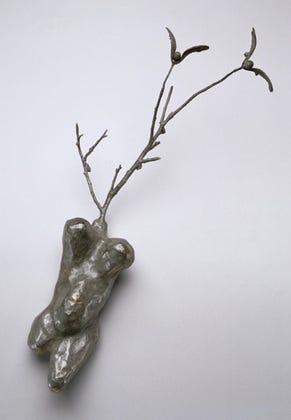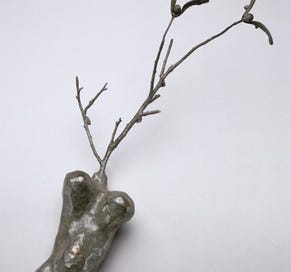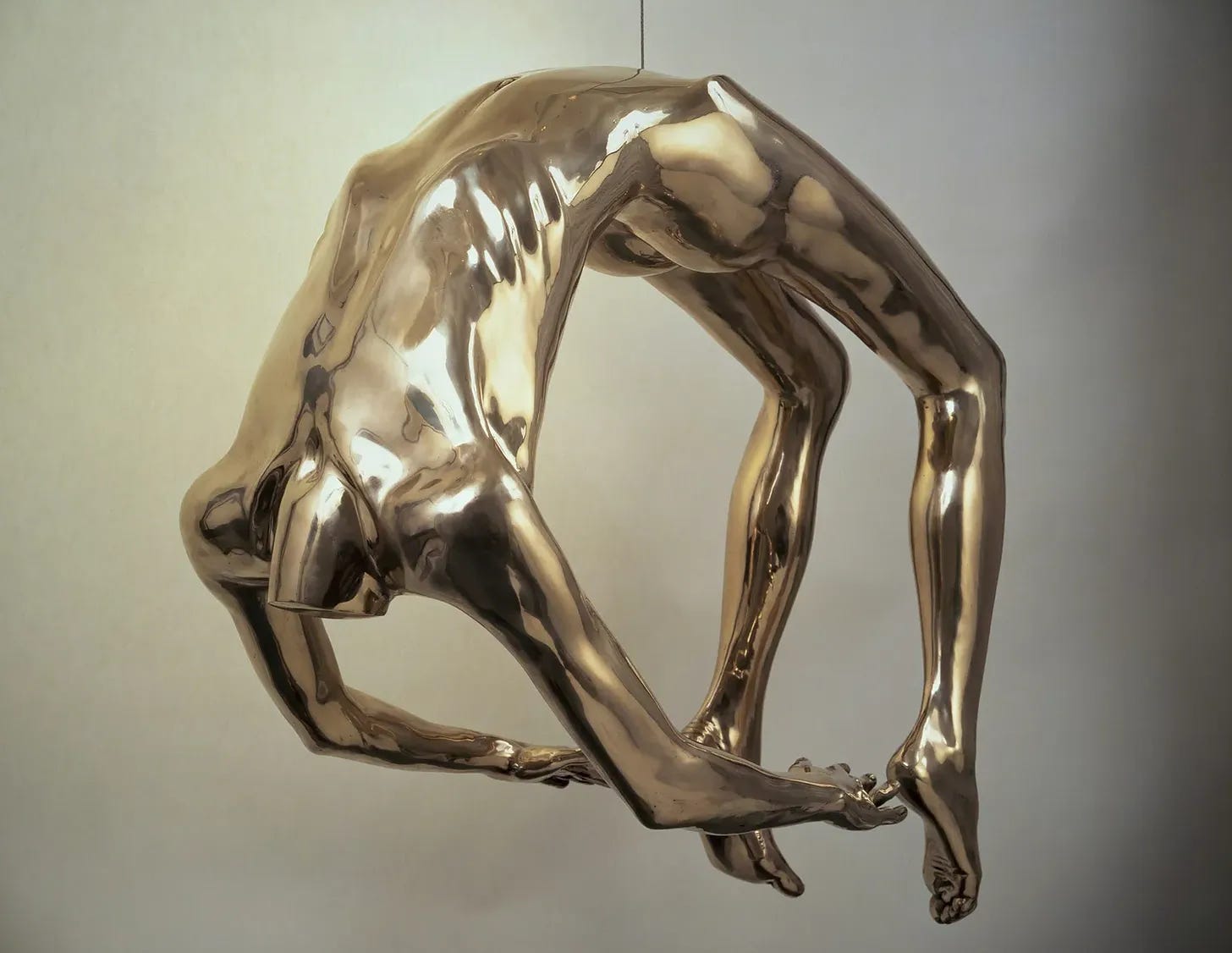
Tuesday night Richard went to bed before the results of the election were confirmed. I stayed up, and as a gray cloud moved over me, I tried to imagine going on. The first four years of Trump were more “kill me now” and “get me out of this” than even high school. I wrote this to steady myself: I don't know what people are or why they act the way they do, and all the theories I have read over the course of my life are sawdust. I'm thinking how to continue and what swims to mind is write with love and write with imagination and don't let anything stop you, including the sense right now you are numb and flattened. The loss of hope always proves temporary.
The next day, I thought about the voice of now. What does it sound like, and in what ways might it sound particular to this time? Is there a volume, a vocabulary, a grammar of our moment? How we talk to each other. How we talk to each other so it's possible to listen with enjoyment depends on tone. Tone is in a way everything and also smoke. I'm saying that writing now—as well as always and more than ever—is the way we embrace each other and look into the face of a sentence to keep us standing. Or sitting if you need to sit but not too long because, you know, you could get used to it.
It's calming to think creatively. You substitute a set of feelings that want you on the mat and gasping for a set of feelings that wonder if this is the best word to snap into focus a reality offered so we're not alone. So we're not stranded in our heartsick selves. And so we can keep adding love and circulating our bodies and ideas.
This morning Richard and I were talking about language and assumptions attached to people as they age. You think about old people one way when you’re young and your understandings shift as you enter the category other people assign you. You may or may not accept this category for yourself. I have not accepted any category based on biological factors that are thought to be essential but are organized by humans for convenience and power.
Richard is 74 and I am 78, and we don’t feel old or see ourselves as old in terms of the assignment we know exists for people with our numbers. People see Richard in a way that’s different from me because he’s a man and because he’s slim and has good posture. His hair is light gray, so who knows what people think.
What’s operative is he’s a man, and men get passes through life meant to spare them embarrassment and a sense of waning authority. Alternatively, it’s pushed in the faces of women, all the time they exist, their bodies are being used to apportion their range of motion.
Richard said, “Old people are assumed to be stupider than young people. It’s taken for granted you won’t notice the condescension.” I thought this was interesting and might be something that was happening to me with people who didn’t know me well but knew I’d been doing this thing in the 1970s or that thing in the 1980s. What I think I’m noticing with strangers and casual acquaintances is a kind of presumptuousness to make remarks I find aggressive and insulting. It’s sometimes pretty subtle, and I’m not going to give you examples because I don’t want to put other people on the spot in this conversation.
Although I will tell you one thing. I recently saw a new medical doctor up in Hudson, a woman my age actually, and although she had no knowledge of my sense of balance and athletic abilities thought in time I might want to use a tricycle instead of a bike to get around. I said something like, “Are you insane?”
I’m addressing a tendency, and it has the feeling of a vapor that may or may not always exist. Once you’re hyper alert to the possibility of insult, you become unsure if it’s really happening unless it falls on your head like a tricycle. Richard said, “You need to call the person on their insult on a case by case basis. Most likely, they have no understanding of the values they’re communicating in their words and facial expressions. We carry all this measuring of older people around. We practice feeling condescension our whole lives.”
Of course, I’d carried these understandings when I was young and had not been able to imagine my life at 78. I didn’t have to. I’m not sorry I didn’t think about the future. I lived in the moment then as I live in the moment now. I think I’m more intelligent than I’ve ever been, more creative and smarter. Richard says, “You’re smarter in a different way from when you were younger. Your intelligence carries all your experience.” I think he’s right.
In related news.
There are men I’ve had sex with who are now friends. I love them with the freedom of we are not having sex again. I want to tell you something interesting about time. We are not having sex again not because we're old or the thought no longer enters our minds. You have sex, and you have fantasies, and you are aroused by erotic words and images your whole life, starting when you are very very young. These former lovers and I are not having sex again because we’re not having sex again. The sex we had left a smudge that was warm-hearted or hot, and now we notice the other one is a person. By we, I mean me. Seeing past the sex, I couldn't have done that in the past. It's definitely some kind of change in the course of time. Who ever knows what change is?
More related news.
Two men I wanted more than they wanted me. One I had sex with. One was a friend. The way they placed their needs above anything else reminded me of me except for the way I was with them. I put up with them and resented them and didn’t know what else to do because I wanted them more than they wanted me. There is something to be said for wanting someone more than they want you. The wanting makes you less critical and more loving in a way that shows you rooms you didn’t know were in your house.
Richard and I want each other the same. That’s why we don’t leave each other. One day, we were waiting for a friend to call us back. We were far from home, and Richard didn’t want to wait, and he wouldn’t get out of the car to look at a waterfall near the carpark where we were waiting. I walked up a small hill. The waterfall was spilling above a ledge of stones from a reservoir, and the mood was peaceful. The water in the lake was still. The clouds above were gray, the whole sky was a soft gray color without any warm tones, and I thought Richard would have enjoyed the view because as soon as I saw it, the mood in the car entirely melted inside me.
I was interested in how angry and obdurate Richard was acting and the freedom he was feeling to be this way. Later that night, when we were home, he said he was sorry for the way he’d behaved. I was glad he apologized. He thinks I allow myself to become angry at any moment of the day and night, and he’s right, and this is a terrible aspect of me for other people. So, when he was the worse one in the car, I was happy it was him for a change instead of me.








It'a always a pleasure to be part of the @Oldster world and especially now, as we seek community more than ever. You are invited to the next Zoom conversation on writing craft, where you can ask questions about your own writing projects, on Saturday, November 23 from 3 to 4 EST. To RSVP, please write to me at lauriestone@substack.com
Thank you, Laurie. "Your intelligence carries all your experience.” This particularly resonates with me. Our intelligence is fed and watered by experience and becomes a greater and better thing as the years go on. On condescension, a question I intensely dislike is "What was it like in your day?" My reply is usually "Considering I'm still seeing daylight, what part of my day do you mean?" Although ironically my eyesight is failing quite rapidly. I'm dictating most of this. This is something I am having difficulty accepting. I'm sure there are others who could identify with that.